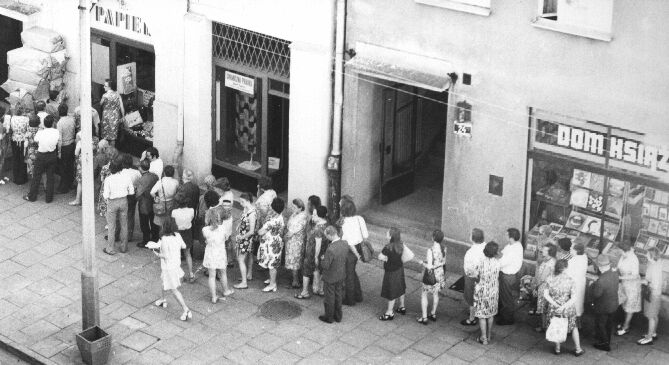- Shortage economy
Shortage economy (Polish: "gospodarka niedoboru", Hungarian: "hiánygazdaság") is a term coined by the Hungarian
economist ,János Kornai . This is a term he used to criticize the old centrally-planned economies of thecommunist state s ofEastern Europe . In his article "Economics of Shortage (1980)", which is generally viewed as his most influential and best-known work, János Kornai argued that the chronic shortages seen throughout Eastern Europe in the late 1970s (and which continued during the 1980s) were not the consequences of planners’ errors or the wrong prices, but rather systemic flaws.It is important to note that a shortage of a certain item does not necessarily mean that the item is not being produced; rather, it means that the amount of the good demanded exceeds the amount supplied at a given price. (See
Supply and demand ) This may be caused by a government enforced low price which encourages consumers to demand a higher amount than is supplied. Kornai, however, concentrates on the role of reduced supply, and argues that this was the underlying cause of Eastern European shortages during the 1980s.Definition and characteristics
thumb|right|300px|A_queue_in_front_of_a_shop_-_a_common_sight_in_the_People's Republic of Poland during the 1970s and 1980s. In this case, buyers are waiting to purchasetoilet paper .] According to János Kornai, a shortage economy has the following characteristics:
*shortage s that are:
** general, that is, in all spheres of the economy (consumer goods and services, means of production and producer goods)
** frequent
** intensive
** chronic
** horizontal and vertical
** replaced by occasional slacks (surplus es)
* buyers’ and sellers’ market change
*forced substitution s
*forced saving s
*soft budget constraint
* paternalistic behaviour
*repressed inflation Buyers' actions
Again according to János Kornai, the possibilities facing buyers in a shortage economy are the following:
* event 0: buyer goes to a shop, the item sought is there, and the purchase is made immediately. This is the normal situation if there is no shortage. In Kornai's view, a shortage economy is by definition an economy in which this event happens rarely.
* event 1: the item is there but the buyer has to queue for it, as there are fewer items than buyers. Sometimes queues also formed only on the "possibility" (or gossip) of an item's availability. Consumers spend considerable time queueing, often many hours a day for basic products like
food . For certain other goods there is awaiting list , which in some cases can be very long. For example, the wait for an apartment in theSoviet Union during the 1980s was typically 10 to 15 years - so families had to plan and buy in advance the housing for their children to live in.* event 2: the item is not available, so the buyer accepts a
forced substitution , i.e. he is buying something else that is more or less a close substitute. This substitution is compulsory, because the original item has sold out.* event 3: the item is not available so the buyer searches for it elsewhere, or the item is not available now but it is known that it will be in the future, so the buyer decides to postpone the purchase. This is a form of forced saving, as the consumer is unwillingly saving his money.
* event 4: the item is not available so the buyer abandons purchase completely.
* event 5: another unrelated item is available, so the buyer purchases it (even if he does not need or want it) on the hope that he will be able to profit from trading it with someone else who has the item he needs. This event increases demand for unneeded items, simply because they are available.
See also
*
Economic shortage
*Consumer goods in the Soviet Union References
* Kornai, János, "Socialist economy", Princeton University Press, 1992, ISBN 0-691-00393-9
* Kornai, János, "Economics of Shortage", Amsterdam: North Holland Press, Volume A, p.27; Volume B, p.196 .
* Gomulka, Stanislaw: "Kornai’s Soft Budget Constraint and the Shortage Phenomenon: A Criticism and Restatement", in: Economics of Planning, Vol. 19. 1985. No. 1.
* "Planning Shortage and Transformation. Essays in Honor of Janos Kornai", Cambridge, Mass.: MIT Press, 2000External links
* [http://www.be.wvu.edu/divecon/econ/trumbull/gradcompsys/shortage1.ppt Part 1] and [http://www.be.wvu.edu/divecon/econ/trumbull/gradcompsys/shortage2.ppt Part 2] of COMPARING AND ASSESSING ECONOMIC SYSTEMS, Shortage and Inflation: The Phenomenon, PPT (PowerPoint file presentation) at West Virginia University
* [http://faculty.vassar.edu/kennett/Kornai.htm János Kornai 'The Soft Budget Constraint']
* [http://faculty.vassar.edu/kennett/Lipton.htm David Lipton and Jeffrey Sachs 'The Consequences of Central Planning in Eastern Europe']
Wikimedia Foundation. 2010.

